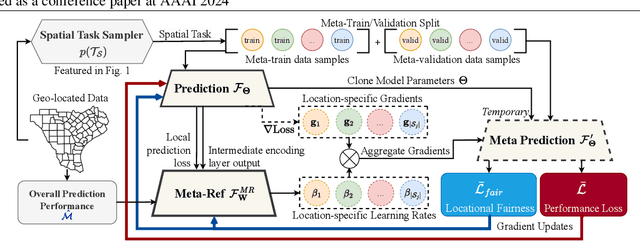Referee-Meta-Learning for Fast Adaptation of Locational Fairness
Paper and Code
Feb 20, 2024



When dealing with data from distinct locations, machine learning algorithms tend to demonstrate an implicit preference of some locations over the others, which constitutes biases that sabotage the spatial fairness of the algorithm. This unfairness can easily introduce biases in subsequent decision-making given broad adoptions of learning-based solutions in practice. However, locational biases in AI are largely understudied. To mitigate biases over locations, we propose a locational meta-referee (Meta-Ref) to oversee the few-shot meta-training and meta-testing of a deep neural network. Meta-Ref dynamically adjusts the learning rates for training samples of given locations to advocate a fair performance across locations, through an explicit consideration of locational biases and the characteristics of input data. We present a three-phase training framework to learn both a meta-learning-based predictor and an integrated Meta-Ref that governs the fairness of the model. Once trained with a distribution of spatial tasks, Meta-Ref is applied to samples from new spatial tasks (i.e., regions outside the training area) to promote fairness during the fine-tune step. We carried out experiments with two case studies on crop monitoring and transportation safety, which show Meta-Ref can improve locational fairness while keeping the overall prediction quality at a similar level.
 Add to Chrome
Add to Chrome Add to Firefox
Add to Firefox Add to Edge
Add to Edge